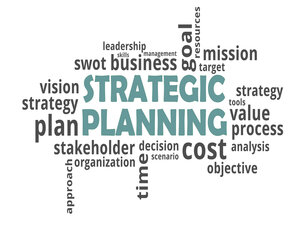Course Overview
Strategic planning is the skill of developing detailed business plans, putting them into action, and then assessing how well they worked in light of the organization’s overarching long-term objectives. It is a theory that emphasizes combining several organizational divisions to achieve a company’s strategic objectives.
The strategic planning and management course will teach you the theories and principles of strategic planning as well as the procedures, strategies, and equipment needed to create and carry out an effective strategy plan.



Course Objectives
- Identify strategic planning issues
- Create a strategic plan that is competitive.
- Differentiate the primary analytical and theoretical approaches used in strategic planning.
- By incorporating strategy, goals, measurements, and execution, bring their corporation into alignment with their planning objectives.
- Determine how to establish strategic models and come up with applications for their company
- Adopt a customer-centric approach to strategic planning.
- Explain how your company’s business actions, those of your competitors, and those of your customers affect the outcomes in your marketplaces.
- Determine the most effective way to carry out their strategic planning.
Organisational Benefits
- Gain from educating your staff about the definition and significance of board effectiveness in businesses, especially if it has any bearing on the main goals, values, mission, and vision of your company.
- Concentrate and target your efforts on the protocol and practices of the Board of Directors.
- By ensuring a connection between the board and operational employees, the business may strengthen its synergy, which will raise employee morale and boost productivity.
- Critically evaluate your organizational capabilities in terms of conformity with the aforementioned principles by conducting a gap analysis and performance audit.
Personal Benefits
- Enhance your performance through increased productivity and enhanced communication with your operational personnel by becoming aware of the effects and long-term benefits of adhering to board norms and procedures.
- Understanding the Board Practice Principles
- Participate in productive discussions about the subject to enhance organizational capability and communication in general.
- Put your knowledge about the effects of board effectiveness in your organization’s context and integrate it.
- Demonstrate knowledge of and comprehension of the key tenets governing the execution of board effectiveness. Training
- Recognize the many individuals, institutions, and organizations that interact with the Board of Directors in an organization, as well as their roles, functions, and responsibilities.
- Determine and assess the primary flaws that contribute to your organization’s board’s inefficiency.
Governance and Board Development Training Highlights
Training Feedback
Happy Customers
Course Outline
Strategic Planning and Management Overview
- Definition and attributes of a strategy
- Strategic management overview
- Overview of strategic planning
- Aspects of a strategic plan
- What makes a strategic statement?
- Strategic management and planning are important in organizations.
The Strategic Foundations
- Distinguishing between a mission and a vision
- The Function of Core Values in Strategic Planning
- Explain Your Unit’s Unique Value.
- The importance of purpose in creating high-performance organizations that provide result
- Statements of purpose and vision
Process of Strategic Planning and Management
- Environmental Evaluation
- Strategy Development
- Putting a Plan Into Practice
- Strategy Assessment
Examination of the Environment
The atmosphere outside
- macro and micro variables
- Market and Macrotrends
- The matrix of relevance and performance
An internal setting
- Internal Assessment Elements
- Core competency concept
- Culture Matters in Internal Assessment
- Diagnostic Internal Assessment
Tools and methodologies for internal and external assessments
Choosing Strategically
- Synthesis of data, perception, and imagination in strategic planning
- carrying out a SWOT analysis
- Choosing strategic objectives using a SWOT analysis
- Identifying the integrated parts of the organization
- Performance targets and strategic imperatives
Key Elements of Strategic Plan Construction
- What you believe
- Mission, guiding principles, and internal/external evaluation
- What do you hope to achieve?
- Vision, objectives, and goals
- Where are you going? Strategic Plan
- the creation of strategic projects
- Creating a plan of action
- metrics of strategic performance
- What are the hazards to the strategy?
Sharing and Carrying Out the Strategic Action Plan
- Locating executional gaps in the strategy
- Increasing commitment through a variety of communication channels
- Set performance standards for individuals and teams that are related to the strategic action plan.
- Directing the organization in the desired direction
- Linking recognition and rewards to strategic advancement
Strategy Evaluation
- The significance of strategy reviews
- holding sessions for strategic reviews
- creating an agenda for a strategic review
- modifying the plan
Strategic Planning: Three Ds
- Decisions
- Direction
- Dedication
Strategic Issues in a Competitive Setting
- Market effects of partnerships between rivals and between rivals and customers
- How links between competitors affect changes in industries
- Data, vision, and innovation principles
- Performing a SWOT analysis
- Issues of strategy and creative strategies
Strategic Analysis
- Strategic thinking context
- Important elements of strategic thinking
- utilizing instruments of strategic thought
- process of strategic thinking
Governance and Plan
- Strategic leadership: what is it?
- Strategic management and the role of strategic leadership
- Requisite abilities for a strategic leader
- Strategic leadership guidelines
Who Should Attend
- Senior marketing directors or managers
- Relationship managers and
- Customer relationship managers
- Professionals in customer service, supervisors,
- Team leaders, and managers
- Sales experts, salespeople, and sales analysts
- Entrepreneurs and founders of startups
Trainers Available for:
- In-House Trainings
- Online Training
- 2 Hours Crush Program
- Half Day Program
- One Day Program
- Two Days Full Program
Training Techniques
- Power point Presentations
- Engaging conversations
- Case studies
- Exercises in solving problems
- Focus Group Conversations
- Games in Management
- Skits and modeling the part
Request a Quote

